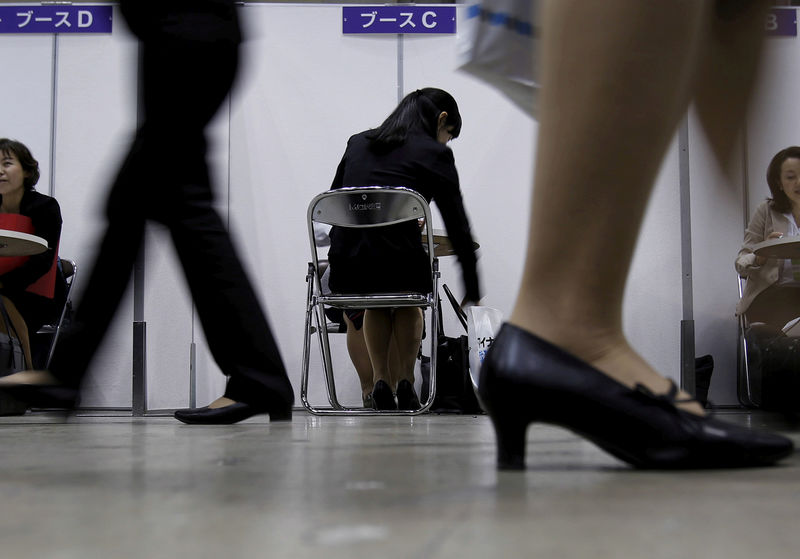By Stanley White and Teppei Kasai
TOKYO (Reuters) - In April last year, Matsuri Takahashi, a promising graduate of Japan's top university, landed a job at Dentsu, one of the country’s most prestigious advertising agencies, renowned for its hard-driving work culture.
Nine months later, she jumped to her death, leaving behind a trail of public grievances on social media about her relentless working hours and boss's verbal abuse.
Japan's labour ministry last month ruled the 24-year-old's death "karoshi", literally "death by overwork" and raided her employer, Dentsu Inc (T:4324), to see if overwork abuses were pervasive in the company.
For many Japanese, Takahashi's death is the tragic consequence of Article 36 of Japan's labour code, which leaves overtime pay and limits to the discretion of employers and typically benign unions.
That loophole could be challenged as Prime Minister Shinzo Abe embarks on a wide-reaching campaign to reform Japan's employment laws, which could include stiffer overtime regulation for companies.
"The law does not prevent companies from working employees beyond reasonable limits," said Emiko Teranishi, head of the Families Dealing with Karoshi, a support group. "The unions are also responsible because they accept these conditions."
Such groups say companies often intimidate employees, especially new hires, into working excessive hours to prove their worth.
Japan's first white paper on karoshi released last month showed 22.7 percent of 1,743 companies surveyed had employees who in the past year worked more than 80 hours of overtime in a month, the government's threshold for karoshi.
Takahashi clocked 105 hours of overtime in October 2015 and fell into depression the following month, a summary provided by her family's lawyer citing the government report showed.
Japan officially recognises two types of karoshi: death from cardiovascular illness linked to overwork, and suicide following work-related mental stress.
In the fiscal year ended March 2015, there were 93 suicides and attempted suicides from overwork, down from 99 the previous fiscal year. The number of deaths from cardiovascular illness linked to overwork fell to 96 from 121.
Labour Minister Yasuhisa Shiozaki last week told reporters that he wants to strengthen monitoring of companies' overtime practices and that his ministry would decide a punishment for Dentsu based on the results of its investigation.
According to one person with knowledge of the agenda for Abe's panel, a new law placing legal limits on overtime hours could be considered.
This would mean revising Article 36 to cap overtime to anywhere from 45 to 80 hours a month, said the person, who declined to be named because the plans are not final.
Article 36 and other issues will be examined by Abe's panel on labour reform, which is expected to issue a plan next March.
A HARD SLOG
Labour groups and business lobby representatives involved in Abe's panel are likely to discuss whether the law will exempt certain industries from those limits.
In Japan's strongly pro-employer economy, changes to overtime regulation, if they come, are unlikely to sail through unchallenged.
Hard work and sacrifice have long been synonymous with Japan, one of Asia's earliest tiger economies, and strong social expectations make it difficult for employees and unions to aggressively push for reforms.
Workers often feel a debt of gratitude for being hired, and are reluctant to quit even if conditions are bad. Others feel they have to work longer hours than their colleagues to get promoted.
In recent years, the government has revised labour laws to encourage shorter working hours, but critics say these steps relied too much on self-regulation.
"Many companies expect young employees to work long hours to learn new skills," said Yasuko Oshima, a senior economist at Mizuho Research Institute who specialises in labour policy.
"Companies have been cutting labour costs since the 1990s, which increases each individual's work burden."
REASONS FOR LIVING
Takahashi's case is not the first time Dentsu has been called to account for its overtime practices.
The Supreme Court ruled in 2000 that the agency was responsible for the suicide of an employee in 1991 because excessive work hours pushed him into depression.
In an e-mail to employees on Oct. 17, Dentsu's CEO Tadashi Ishii said the company could face criminal prosecution as a result of Takahashi's death. He also said the company would lower monthly overtime limits to 65 hours from 70 hours a month, according to a copy of the email obtained by Reuters.
Dentsu told Reuters it is cooperating with authorities and declined to comment further.
The lawyer for Takahashi's family declined to comment on whether they will sue Dentsu. The family refused interview requests.
For now, Takahashi's death has pushed the thorny issues of karoshi and workplace harassment into the spotlight as policymakers look to address other challenges around labour.
Several months into her new job, Takahashi, a graduate of Tokyo University whose first name Matsuri means "festival", started complaining on Twitter about her male boss insulting her appearance, sleeping only two or three hours a day and regularly working weekends.
"When you spend 20 hours a day at the office you no longer understand what you're living for and can't help but laugh," she tweeted on Dec. 18.
On Christmas Day, she jumped off a company dormitory.

"My daughter is never coming back," Takahashi's mother said last month, domestic media reported. "No job is more important than your life. I strongly hope that karoshi doesn't happen again."